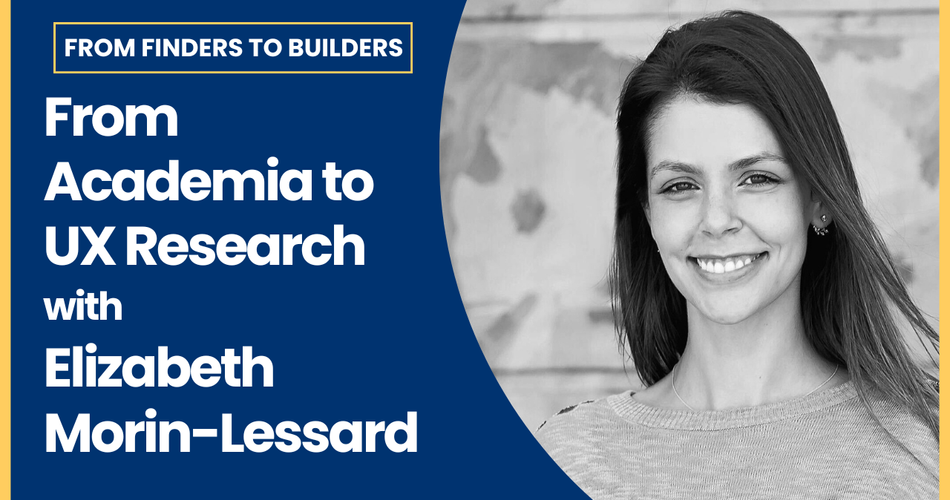Hello everyone, and welcome to another exciting episode recap of "From Founders to Builders."
Today, we're diving into the story of Elizabeth Morin-Lessard and her remarkable transition from academia to UX research.
This post encapsulates our recent conversation and highlights the key points Elizabeth shared about her journey, challenges, and advice for those considering a similar path.
The shift from academia to a career in user experience (UX) research is becoming increasingly common. Many scholars find themselves wondering whether they should take the leap into the tech industry. Elizabeth's story is a testament to the possible successes that come alongside this transition.
Let's dive into her journey!
Elizabeth's Background and Transition
Elizabeth Morin-Lessard is currently a UX researcher at Elastic, a company specialized in developer tools and services. Her academic roots are actually in psychology, where she specialized in bilingualism and language acquisition both in children and adults. Like many, the COVID-19 pandemic provided her with a moment of introspection, leading her to question her long-term career in academia.
During lockdown, Elizabeth reflected deeply on her career aspirations and personal values. She realized that academia might not align with her lifestyle and career objectives. The thought of being geographically bound due to tenure and the lack of flexibility in moving often were among her primary concerns. This led her to explore opportunities in the industry.
Overcoming the Initial Fear
Elizabeth candidly shared that her initial feelings about transitioning to UX research were driven by fear and uncertainty. Academia had become a familiar bubble, and stepping out of it seemed daunting. However, her innate research skills came in handy as she gathered information, read blogs, and talked to people within the tech industry.
Challenges in the Job Search
Finding a job outside academia came with its own set of challenges. The end of 2020 and the beginning of 2021, though considered the golden age for UX research, still demanded a significant effort on Elizabeth's part. She had to understand how her academic skills translated into industry-relevant competencies. Additionally, she faced the emotional challenge of leaving ongoing projects and collaborations in academia.
Navigating the New Role
Once Elizabeth secured her first UX research position, she realized how different the industry was. The terminology, pace, and application of skills in a business context were all new to her. She underscored the importance of understanding industry-specific lingo and the need to adapt quickly to a faster-paced environment. Her academic background equipped her well with research and analytical skills, which she successfully applied in her new role.
Differences Between Academic and Industry Research
One of the major differences, as Elizabeth pointed out, is the timeline. Academic research often allows for extended periods of study and rigorous methods, while industry research demands quicker turnarounds. The focus also shifts from advancing knowledge for its own sake to applying research findings to inform business decisions. Understanding how to communicate findings effectively and gaining influence within the company were other critical aspects of her new role.
Advice for Aspiring UX Researchers from Academia
Looking back, Elizabeth found the transition to be a positive move. She learned that her love for research extended beyond the niche of bilingual language acquisition.
She also shared three key pieces of advice for academics considering a transition to UX research:
- Do Your Research: Just as in academia, thorough research is crucial. Understand the roles, required skills, and the industry’s expectations. Make a plan, read extensively, and prepare yourself for the transition.
- Network Actively: Connect with people who have made similar transitions. Engage in informational interviews, follow relevant industry professionals on LinkedIn, and seek advice from coaches or mentors. Building a network can provide invaluable support and insights.
- Take the Leap: While the transition may seem daunting, Elizabeth encourages taking the leap. The potential rewards and career fulfilment significantly outweigh the initial fears and uncertainties. Embrace the change and be prepared to learn and adapt.
Moving Forward
Elizabeth’s journey from academia to UX research is an inspiring example for many researchers contemplating a similar move. Her experience underscores the value of being adaptable, proactive, and open to new opportunities.
To all those considering this transition, remember that your skills as a researcher are highly valuable in the industry. With careful planning, networking, and a willingness to step out of your comfort zone, you too can find success and fulfillment in the tech world.
Listen to the full episode:

Subscribe to our email newsletter and unlock access to members-only content and exclusive updates.


Comments